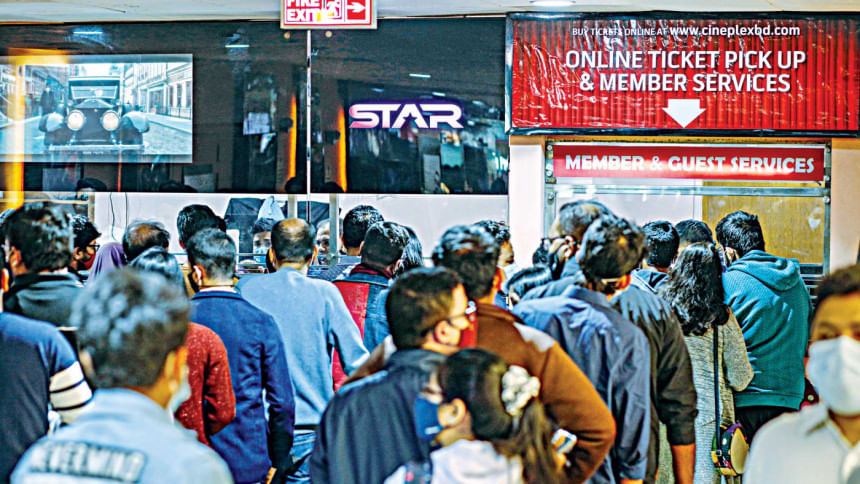Multiplex theatres grow bigger as investment surges

Twinning plants have clambered up its entrance and covered most of the ground leading to it. Filthy water has made a puddle as well. Had the name had not been there, most of the people, unfamiliar with the place, would consider it as a desolate structure.
This is Poonam cinema hall, located in Kadamtali in the Dhaka South City Corporation. A popular place for cinema-goers in the 1990s, the theatre has been closed for two years.

This reflects the sorry state of a majority of cinema halls across the country, first caused by the years of under investment leading to dilapidated infrastructure and a lack of high quality movies and then by the coronavirus pandemic, which brought forward early demise for many than expected.
The picture is different for multiplexes as the theatres with multiple cinemas have grown in popularity since its introduction in Bangladesh in 2002.
The investment in multiplexes has shot to Tk 60 crore from Tk 5 crore, an increase of 12 times compared to initially, in the last two decades, according to investors.
"This shows that audiences still want to watch movies in comfortable environment that they are getting from the multiplexes," said Mahaboob Rahman Ruhel, chairman of Star Cineplex.
Show Motion Limited, an entertainment-based specialty contracting company, introduced the multiplex movie theatre in Bangladesh in 2002. Today, it has several branches in Dhaka.
Star Cineplex, the first multiplex of Show Motion, started its journey at the Bashundhara City Shopping Mall in Panthapath with an investment of Tk 5 crore and a workforce of 40.
It has six screens, with a total capacity of approximately 1,600 seats.
The theatre at Shimanto Shambhar Shopping Mall in Dhanmondi has three fully digital cinema screens with a capacity of 700 seats.
In order to further expand its footprint, Star Cineplex opened its third branch at the SKS Tower in Mohakhali. The three halls have a combined seating capacity for 500 people.
The latest branch opened at the Sony Square Mall in Mirpur. Its three cinema screens can serve 769 viewers.
Star Cineplex started its journey with three theaters, where Spider-Man was first screened.
The company counted losses in the initial years as people were not showing up as expected, recalled Ruhel.
"The first two years were very difficult. We were on the verge of bankruptcy. But we didn't lose hopes."
It turned around with two movies: Gladiator of Hollywood and Molla Barir Bou of Bangladesh. Now the company releases movies on the same day as in the Hollywood.
On average, it releases two movies each month, Ruhel added.
"We started the business in the country by bringing in the latest technology at that time. We reaped the benefit of technological advancement."
SINGLE SCREEN CINEMA HALLS CLOSING
There were as many as 1,235 cinema halls in the country in 1998. The number has nosedived significantly in the last two decades.
Currently, about 60 halls are in operational. The number doubles to 120 during Eid festivals, according to the Bangladesh Film Exhibitors Association, a platform of theatre owners.
"We could not keep pace with changing times, so we have lost money," said Mia Alauddin, senior vice-president of the Cinema Hall Owners and Exhibitors Association.
"In most areas, the owners have built multi-storey shopping malls demolishing theatres."
There are many districts and even divisional cities that have no single cinema hall at the present, he said, adding that 80 per cent of the workers involved in this sector have quit their jobs in the last 10 years.
Although the number of foreign movies released in the country has remained almost unchanged, the number of domestic movies released has decreased over the years.
According to the Bangladesh Film Censor Board, 328 foreign films received censor certificates from 2015 to 2020 against 321 local movies.
"Our single screen owners have not been able to adapt to technological advances. That's why they are in a sorry state," Ruhel said.
Producers and directors in Bangladesh need to understand the kind of films viewers like to watch, he says.
"The restrictions on screening movies from the subcontinent should be lifted. We are losing because viewers are watching Tamil and Telugu movies in one way or another. Ultimately, we are being deprived of revenue."
OPERATORS EYE EXPANSION
Silver Screen, a multiplex operator, started its journey in August 2018 in Chattogram, setting up the first such movie complex in the port city.
"We have plans to build another multiplex," said Faruk Ahmed, one of the partners of Silver Screen.
He says the government has provided some facilities to attract investment in this sector. But planning has been disrupted because of the pandemic.
The cost of building a 100-seat multiplex has gone up to Tk 5-8 crore, from Tk 3-4 crore, previously as prices have risen for the construction materials for the building as well equipment needed to run cinemas.
Jamuna Group's Blockbuster Cinemas, which started its journey in 2013 at the Jamuna Future Park in the capital, plans to invest.
It has seven cinema halls, with 1,680 seats, employing about 75 people, according to Zahid Hossain Chowdhury, head of operations of Blockbuster Cinemas.
Star Cineplex plans to set up 100 digital screens across Bangladesh.
It is going to launch a new multiplex at Bali Arcade Shopping Complex on the Nawab Sirajuddaula Road in Chattogram's Chawk Bazar next year. It will be fully furnished and modernised cinema halls with a capacity for around 400 viewers.
The investment will be Tk 15-20 crore, Ruhel said. He and Aftab Alam, chairman of The Casablanca Limited, signed an agreement to this effect recently.
Star Cineplex also inked a deal with the Bangladesh Police Welfare Trust on October 3 to open a theatre at the Police Plaza at the Satmatha intersection on Nawab Bari Road in Bogura.
Talks are also underway with potential partners to open a new multiplex in Rajshahi.


 For all latest news, follow The Daily Star's Google News channel.
For all latest news, follow The Daily Star's Google News channel. 



Comments